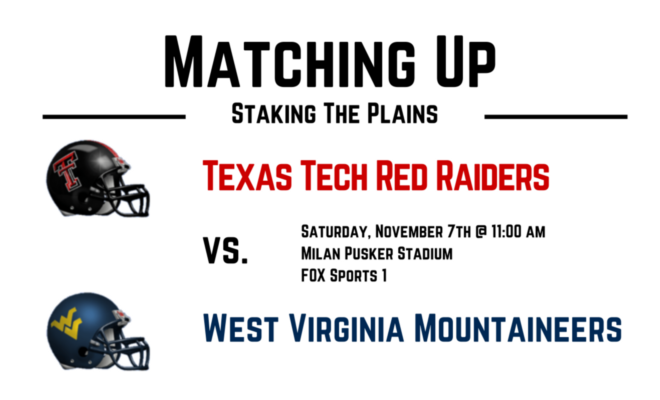The Match Ups
| Texas Tech Pass Offense vs. West Virginia Pass Defense | |
| Texas Tech | |
| Perhaps the biggest move here is one that was a bit under-reported from the press conference, which is that Jonathan Giles is gong to get some looks at the outside receiver position. It’s gotten to the point where the lack of consistency with Reginald Davis and Devin Lauderdale that the coaches want to give the true freshman a chance. I was thinking the other day about how Boykin and Russell have had looked significantly better with a deep guy like Doctson and Coleman, while Texas Tech hasJakkem Grant, it’s different having a guy outside. With Grant, he has to create so much of what he does in traffic, while Doctson and Coleman have to just beat one guy normally on a deep route. Those are tougher passes, but the idea here is that Patrick Mahomes is really doing this without the benefit of a decdent outside receiver. One of the things that made Johnny Manziel so good was Mike Evans going up and getting the ball and Mahomes really doesn’t have that. I also wanted to mention again is the idea that Emeka Okafor very much stepped up at the right tackle spot. He was better than expected. The biggest thing that this offense and Mahomes have to do, is produce on the road. The road / home splits are striking. Texas Tech averages 450 passing yards a game at home and 360 on the road. This is a trend with the entire offense and one that has to be overcome for the two remaining road games. | |
| West Virginia | |
| The West Virginia secondary was supposed to be the strength of the team, and things somewhat went downhill when Karl Joseph was out. The Mountaineers are currently 97th in passing yards allowed, but a lot like Texas Tech, they have played a ton of pass-heavy teams. Even though they lost Joseph, they still have a ton of talented players, including CB Daryl Worley (6-1/202) and CB Terrell Chestnut (5-11/193). Both are big bodied cornerbacks, the type that give the Texas Tech receivers some issues. Chestnut has 22 tackles, 6 passes broken up, and 2 picks, and Worley has 21, plus 2 picks and 9 passes broken up. At the safety spots are FS Dravon Askew-Henry (5-11/202), who is the third leading tackler on the team, BS Jarrod Harper (6-1/211) and SPUR KJ Dillon (6-1/209), who is the 4th leading tackler on the team, has 5.5 tackles for loss, 1 interception and 5 passes broken up. | |
| ADVANTAGE: | Texas Tech |
| Texas Tech Rush Offense vs. West Virginia Rush Defense | |
| Texas Tech | |
| Just to continue with the road / home splits, Texas Tech averages 208 yards a game at home and 168 on the road. That’s not as big of a disparity as the passing game, but it sure would be nice to lean on the running game at West Virginia where the Mountaineers are pretty decent against the run. In fact, WVU allows only 150 yards a game at home. I think this is going to be much tougher than previously thought, but the good thing is that DeAndre Washington is pretty consistent, and averages 92 yards a game on the road 113 at home. It’s the other pieces that have to be better on road, namely Justin Stockton and I think the onus (onus?) falls on the coaching staff to make sure that he gets the ball in the correct spots. In fact. In wins, Stockton is averaging 45 yards a game rushing and in losses, only 23. I’d really love to see the running game carry a bigger load on Saturday. | |
| West Virginia | |
| On the three-man front line is NG Kyle Rose (6-4/295), who has 26 tackles, and two ends DE Christian Brown (6-2/290) and DE Noble Nwachukwu (6-2/271), who has 21 tackles, 4.5 tackles for loss and 2.5 sacks. At linebacker are SLB Nick Kwiatkoski (6-2/238), who has 46 tackles, 5.5 TFL and a sack, MLB Jared Barber (6-0/232), who has 30 tackles, 7 TFL and .15 sacks and WLB Shaq Petteway (6-0/232), who has 33 tackles. 5.0 TFL, and 2 sacks. WVU gets a lot of production from their linebackers and the rush defense is 80th overall, allowing 176 yards a game. As an aside, WVU gives up over 200 yards rushing on the road, but only 150 at home. They were really bad against Baylor and TCU, allowing 304 and 228 yards. | |
| ADVANTAGE: | Texas Tech |
| Texas Tech Pass Defense vs. West Virginia Pass Offense | |
| Texas Tech | |
| It’s getting a bit static as to how I write about the defensive portions. There seem to be few, if any, bright spots and lots of problems. Maybe the biggest takeaway is how much better Nigel Bethel, II has been over the course of the year and hopefully this team will have Jah’Shawn Johnson for the entire game. You don’t need me to tell you that the pass defense is spectacularly terrible and I’m not sure what else to say other than hoping for turnovers and maybe hoping Howard has a bad day, which has been the case more than not the last few weeks. Only completing 55% or so isn’t great and WVU hasn’t been good on third downs either, something Texas Tech has been terrible at thus far this year. Hoping for turnovers doesn’t help a ton because Howard really isn’t prone to turning the ball over. | |
| West Virginia | |
| West Virginia is averaging about 250 yards a game and QB Skyler Howard (6-0/206) started off strong, averaging 300+ yards a game his first three games, but he’s fallen off a bit, passing for only 173 against OU, 188 against OSU, 289 against Baylor and 160 against TCU. He’s not bad, just maybe not spectacular. Howard completes about 56% of his passes and has thrown 16 touchdowns to just 7 interceptions. At receiver are WR Shelton Gibson (5-11/192), who leads the team with 25 receptions for 576 yards and 7 touchdowns. He’s “the guy”. WR David Sills (6-3/202) is your other wide receiver and he’s a quarterback convert and has just 5 catches for 106 yards on the year, while IR Daikiel Shorts Jr. (6-1/201) is your inside receiver and has 21 catches for 246 yards. Javon Durante started strong, with 19 catches and 274 yards, but has faded as the season has worn on. West Virginia does employ a tight end, TE Cody Clay (6-4/262) and he’s only had 1 catch for 6 yards, which went for a touchdown. | |
| ADVANTAGE: | West Virginia |
| Texas Tech Rush Defense vs. West Virginia Rush Offense | |
| Texas Tech | |
| Texas Tech “only” gave up 184 yards to Oklahoma State, which is actually an improvement over the week before where Texas Tech gave up 400 yards. The home vs. away splits aren’t all that different, 260 yards at home and 285 on the road. A lot is a lot no matter how you cut it. The Texas Tech rush defense has only held two opponents to less than 200 yards rushing, Kansas and Oklahoma State. The biggest hope that you have here is that the linebackers continue to improve and start to make some plays. I think I’m less confident that the defensive line will make a significant improvement. I hate being so down, but it’s difficult to argue with stats. | |
| West Virginia | |
| The offensive line starts with LT Yodny Cajuste (6-5/295), LG Adam Pankey (6-5/312), C Tyler Orlosky (6-4/296), RG Kyle Bosch (6-5/310) and RT Marquis Lucas (6-4/315). I mentioned the splits on the road and at home for WVU, and the same is true for the running game, where they average 230 yards a game at home and 180 on the road. At running back HB Wendell Smallwood (5-11/202) is your leading rusher with 113 yards a game to go with 17 carries, while RB Rushel Shell (5-10/224) is the primary backup, averaging 47 yards a game and 3 touchdowns. Howard, the quarterback, contributes nearly 33 yards a game, so be on the look out for Howard to tuck and run if he can. | |
| ADVANTAGE: | West Virginia |
| Texas Tech Special Teams vs. West Virginia Special Teams | |
| Texas Tech | |
| Texas Tech had not given up a return for a touchdown, either punting or kickoffs for the entire year until last weekend. That was a pretty terrible time for a return and let’s hope that the coverage units make some adjustments. The kicking game is one that continues to be just fine for my money. Michael Barden doesn’t have Taylor Symmank’s leg, but he’s performing just fine, while Clayton Hatfield is 9 of 10 on field goals and has made 34 of 35 extra points. I’m always surprised that Barden has also made all 19 of his extra points, but the staff is giving both kickers opportunity to kick. Texas Tech is lucky to have a guy like Hatfield back up Symmank as Hatfield kicks 55% as touchbacks and if Symmanks is healthy this week, that’s 73% of his kicks being touchbacks. | |
| West Virginia | |
| I am hoping that you have all pulled out your PK Josh Lambert (5-11/212) voodoo doll. Lambert kicked a long field goal last year to win the game last year and this year he’s hit 10 of 14 field goals and all 28 extra points. Handling kickoffs and punting duties is Nick O’Toole (6-3/216). O’Toole is averaging about 47 yards a punt and for kickoffs, he’s averaging 36% of his kickoffs as touchbacks. KR Javon Durante (6-0/165) and Shelton Gibson are your kickoff returners and Gipson is averaging 30 per game, while PR KJ Dillon is the punt returner and is averaging about 4.7 yards per return. | |
| ADVANTAGE: | Push |
The Tally
Both offenses are favored here, but I don’t necessarily see a high scoring game. Texas Tech is only averaging 32 points on the road and I’d expect to see a similar result, unless Mahomes really breaks free and I think a lot of that is dependent on the outside receivers breaking some things open.









